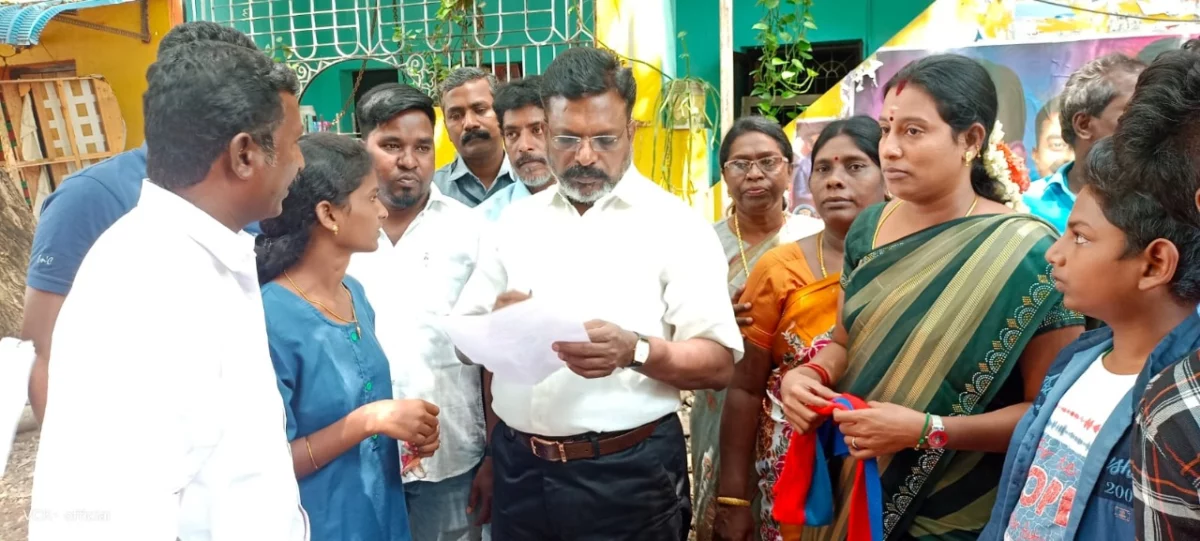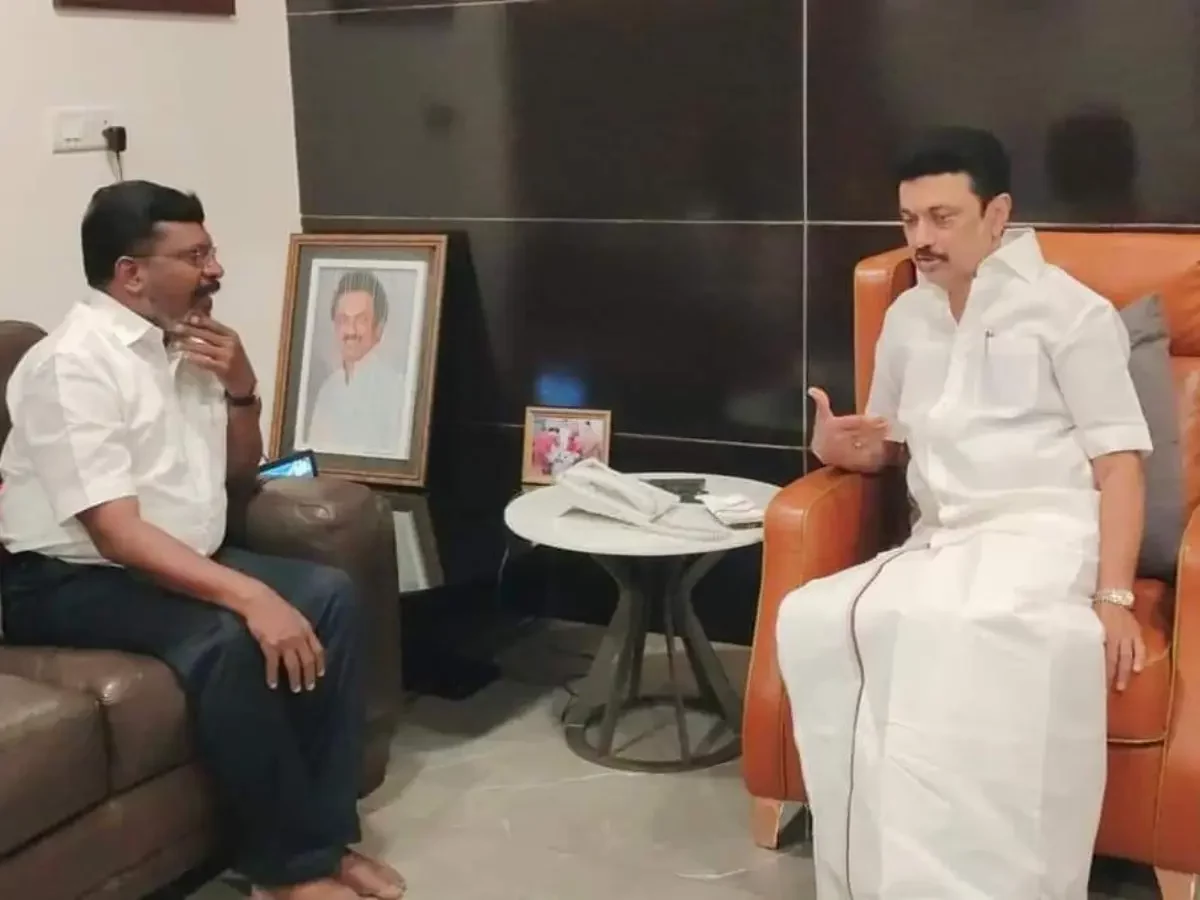Read in : தமிழ்
Viduthalai Chiruthaigal Katchi (VCK) leader Thol Thirumavalavan has taken the centre stage in opposing saffron politics in Tamil Nadu, with nearly all the DMK allies, including MDMK leader Vaiko,the Left parties and DMK’s parent body, the Dravidar Kazhagam, strongly backing his programmes and protests against the BJP and RSS.
Thirumavalavan’s ‘communal harmony’ human chain protests at more than 500 places in the State against “RSS’ efforts to spread hatred and violence in Tamil Nadu” were well attended. Leading the protest at Chennai, he said, “The RSS is not a democratic movement and it is trying to enter Tamil Nadu with designs to divide the people. This is only a rehearsal for the strong opposition that RSS will face in Tamil Nadu and the State government should not allow their activities here.”
The VCK leader was also in the thick of the debate on emperor Rajaraja Chola after the release of the film ‘Ponniyin Selvan-1’. He was present on the stage when film director Vetrimaran raised the issue of the king’s Hindu identity. When the director’s comments drew flak from the BJP and right wingers, Thirumavalvan countered, saying there was no Hinduism at the time of the Cholas and only Vaishnavaite and Saivaite faiths were followed.
Though there were threats from some BJP leaders to ban the VCK, Thirumavalavan dared them to issue a ban and in fact set out another demand that the Hindu Religious and Charitable Endowments (HR&CE)department, that manages Hindu temples and shrines in Tamil Nadu, must be divided into Saivaite and Vaishnavite sections. This was met with further vociferous opposition from the right wing, who alleged that the VCK leader was conspiring to divide Hindu people.
Ever since he celebrated his 60th birthday in August, the leader has been at the centre of debates about the BJP’s ideology and Hindutva. At the birthday function, he flayed the BJP and Sangh Parivar and requested Chief Minister M.K. Stalin, who was present at the event, to take on the BJP at the national level. Stalin replied that the DMK is rooted in the Periyarist ideology against the saffron forces and its ideology will remain the same whether it was in power or not. Since then the VCK leader has become the fulcrum of anti-Hindutva debate in the State.
Thirumavalavan’s ‘communal harmony’ human chain protests at more than 500 places in the State against “RSS’ efforts to spread hatred and violence in Tamil Nadu” were well attended

(Photo credit: Thirumavalavan Twitter page)
However, this is not the first time, Thirumavalavan is taking on the BJP since he has been consistently opposed to the party even when the AIADMK under Edappadi K Palaniswami was in power. Tamilisai Soundarrajan, when she was Tamil Nadu BJP president alleged that theVCK cadre attempted to assault her under the guise of black flag demonstrations following a debate over actor Vijay’s film ‘Mersal’ five years ago. However, he did not become the focus of anti-saffron politics since the DMK too was going hammer and tongs against the BJP.
Thirumavalavan entered the political scene in 1999 when he polled about 2.25 lakh votes in the Chidambaram Parliament constituency as an ally of the Tamil Maanila Congress, led by G.K. Moopanar. However, he was part of the DMK-BJP alliance in the 2001 Assembly elections, the only time he was with the saffron front. Since then, he has maintained his distance and Parliament again in 2009, contesting as part of the DMK-Congress alliance.
Also Read: Whither Dalit political leadership?
Though he became the leader of the erstwhile Dalit Panthers of India (DPI) which was renamed the VCK, Thirumavalavan has his roots in Tamil nationalist ideology since the first protest he organised as a student was a pro-Eelam agitation in which Vaiko, who was then in the DMK took part. Though he remains a staunch admirer of Tiger supremo Velupillai Prabhakaran, his alliance with the Congress in 2009 when the Sri Lankan military offensive was at its peak attracted bitter criticism from Tamil nationalist outfits.
Though the anti-Hindutva narrative in Tamil Nadu revolves around him at the moment, his consistent ideological stance has not helped him form a strong and widespread electoral base for his party. The People’s Welfare Front, in which he was a major constituent failed to reach even a double digit vote percentage and VCK is dependent on the DMK or AIADMK to win representation in the Assembly and Parliament.
Given the high population of Dalit voters in Tamil Nadu and the absence of charismatic leaders like MGR and J Jayalalithaa, the VCK stands a good chance of increasing its vote share especially in the northern districts of the State. A major share of Dalit votes have gone to the AIADMK since its inception in 1972 but the party is facing a leadership crisis now
After dropping the word Dalit from his party name, he announced that his party would function as a Tamil nationalist organisation. Despite the nomenclature change and Thirumavalavan’s pro-LTTE leanings, he continues to be viewed as a leader of Dalits by other communities and till this day, this remains his biggest challenge — to emerge as a mainstream leader in State politics.
But, given the high population of Dalit voters in Tamil Nadu and the absence of charismatic leaders like MGR and J Jayalalithaa, the VCK stands a good chance of increasing its vote share especially in the northern districts of the State. A major share of Dalit votes have gone to the AIADMK since its inception in 1972 but the party is facing a leadership crisis now.
Also Read: Ponniyin Selvan and the politics of Vetrimaaran
The VCK has a strong presence in Cuddalore and Villupuram, Dharmapuri and some constituencies in the delta districts. If Thirumavalavan can create a strong organisation and concentrated vote bank in the northern districts including Chennai’s neighbourhood, besides some delta districts, he may emerge as a stronger leader in alliance politics. His strong anti-BJP pitch may also bring the support of minorities and those section of voters opposed to Hindutva if they see him as a powerful leader who can defeat the BJP in a particular area.
Even with a double digit vote share in the northern and delta districts, the VCK may contest in higher number of seats in a winning alliance, increasing its chances of getting more seats. In such a scenario, Thirumavalavan’s dream of sharing power in the State can become a reality. But, this is only the beginning of a long road.
Read in : தமிழ்
